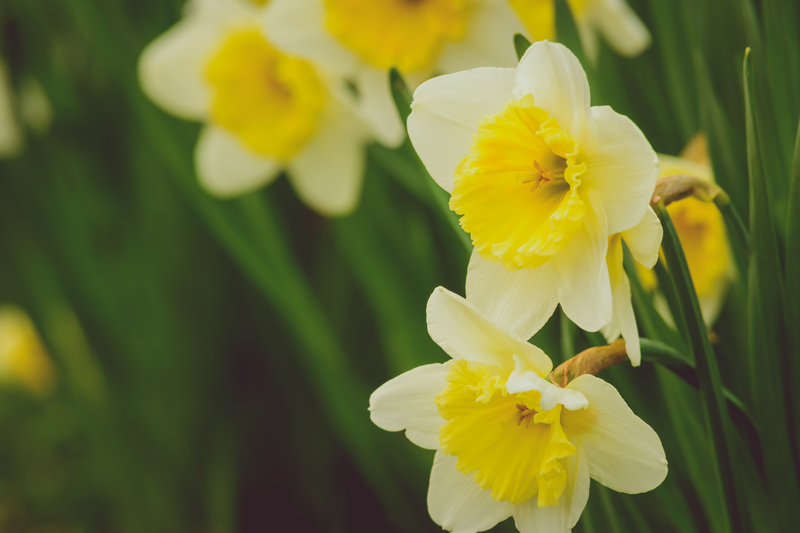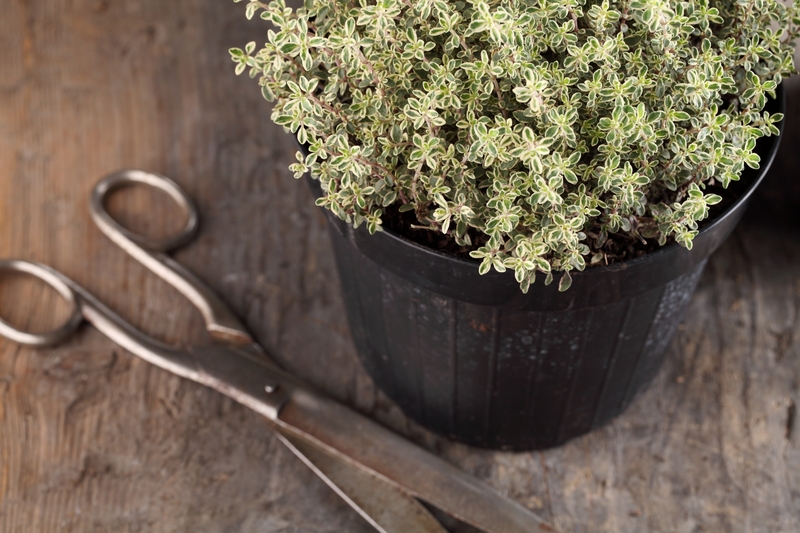Green Thumb Tips for a Bountiful Herb Harvest
Posted on 06/06/2025
Unlocking the Secrets to a Lush and Bountiful Herb Garden
Are you dreaming of stepping outside to snip fresh basil for your pizza, a handful of mint for your tea, or some fragrant rosemary for roasting? With the right techniques, you can create a thriving and productive herb garden right at home. Whether you're working with a sprawling backyard, a petite patio, or just a sunny windowsill, these green thumb tips for a bountiful herb harvest will put you on the path to gardening success. Read on as we explore comprehensive, actionable advice for growing herbs robustly and gathering them at their peak.

Why Grow Your Own Herbs?
Herbs aren't just easy to grow--they're also one of the most rewarding plants to nurture. Fresh herbs provide unmatched flavor, aroma, and nutrients to your dishes, not to mention the health benefits and the sheer joy of harvesting what you've grown yourself. Plus, cultivating your own herbs saves money and reduces food miles, making it an eco-friendly option for every home. You'll find that herbs thrive with just a little attention and that your efforts will be rewarded with lush growth and repeated harvests throughout the season.
Choosing the Right Herbs for Your Harvest
An abundant herb harvest begins with planting the right varieties. Some herbs are easy to grow for beginners, while others require more care. When selecting herbs, consider which ones you use often in your cooking, your climate, and the growing space you have available.
Top Herbs for a Productive Garden:
- Basil: Thrives in warmth and sun, perfect for Mediterranean and Asian cuisine.
- Mint: Fast-growing and vigorous, great for teas, desserts, and savory dishes.
- Rosemary: Hardy and drought-tolerant, adds a fragrant piney note to meats and vegetables.
- Parsley: A biennial staple, perfect for garnishes, salads, and sauces.
- Thyme: Low-growing and flavorful, ideal for roasts and stews.
- Cilantro: Quick-growing, essential for Latin and Asian dishes.
- Sage: Robust, with earthy leaves, a classic for poultry and stuffing.
- Dill: Feathery and aromatic, wonderful for pickling and fish dishes.
Setting the Stage: Soil, Sun, and Water
Your herb garden's foundation is crucial for an abundant harvest. Proper soil, sunlight, and watering routines are the backbone of successful herb cultivation. Here's how to get it right:
1. Soil Quality for Robust Herbs
- Well-Draining Soil: Herbs do not tolerate soggy conditions. Use a light, crumbly soil--amend heavy clay with compost, sand, or perlite to ensure good drainage.
- Rich in Organic Matter: Mix in compost, worm castings, or well-rotted manure to supply nutrients. The soil should be fertile but not overly rich, as too much fertilizer can diminish herb flavor.
- pH Balance: Most herbs prefer slightly alkaline to neutral soil (pH 6.0-7.5). Conduct a simple soil test and amend with lime if your soil is too acidic.
2. Sunlight: The Key to Aromatic Herbs
- Six Hours Minimum: For lush, aromatic growth, aim for at least six hours of direct sunlight per day. Herbs like basil, rosemary, and thyme particularly crave the sun.
- Partial Shade Tolerance: Parsley, cilantro, and mint can tolerate partial shade, especially in hotter climates where afternoon sun can be intense.
- Indoor Herb Growing: If using windowsills, south or west-facing windows provide the best light. Consider supplemental grow lights during winter or in low-light homes.
3. Mindful Watering Practices
- Let Soil Dry Between Waterings: Overwatering is the primary killer of herbs. Water only when the top inch of soil feels dry.
- Morning Watering: Water early in the day to allow leaves to dry and help prevent disease.
- Mulching: Add a 1-inch layer of organic mulch, like straw or shredded leaves, to help retain moisture and prevent soil splashing on leaves.
Planting and Spacing Tips for Bountiful Crops
Correct planting and wise spacing empower herb plants to grow vigorously and fruitfully. Crowding leads to competition for nutrients, poor air circulation, and increased susceptibility to disease. Here are the best practices:
- Follow Seed Packet Instructions: Each herb has unique requirements. Respect spacing guidelines--even for small seeds.
- Group by Water Need: Plant 'thirstier' herbs like basil and parsley together, and keep drought-loving types like rosemary and thyme in their own area.
- Rotate Containers: If growing in pots, rotate their position weekly for even sun exposure and balanced growth.
- Companion Planting: Some herbs such as basil and tomatoes strengthen each other's growth and repel pests.
Pruning and Harvesting: The Art of a Plentiful Herb Harvest
Trimming your herbs is more than just harvesting--it keeps them healthy and encourages bushier, more productive growth. Proper pruning is essential for maximizing your herb yield.
How and When to Harvest Herbs
- Pinch Regularly: Begin harvesting when the plant has at least six inches of growth. Pinch off leaves or stem tips early and often to encourage branching.
- Time of Day: Pick herbs in the morning, after dew dries but before the heat of the day, to capture the most intense flavor and essential oils.
- Use Sharp Tools: Snip with clean, sharp scissors or pruners to minimize damage and prevent disease.
- Never Strip Bare: Only harvest up to one-third of a plant at a time to ensure regrowth and continued lush harvests.
Special Tips for Individual Herbs
- Basil: Always pinch above a pair of leaves--this stimulates bushy, side-shoot growth.
- Mint: Harvest entire stems for bushier plants and increased vigor.
- Chives: Cut down to just above the soil and they'll regrow quickly.
- Parsley: Snip outer leaves first and allow the growing center to mature.
Fertilizing for a Productive Herb Garden
While herbs generally thrive in less rich soils, a strategic approach to feeding them will boost a more plentiful, aromatic harvest.
- Go Easy on Nitrogen: Too much nitrogen produces lush leaves with diluted flavor. Use a balanced organic fertilizer or add fish emulsion monthly.
- Top Up with Compost: Feed your soil with a thin layer of compost mid-season to replenish nutrients naturally.
- Monitor pH and Minerals: Some herbs, like lavender and sage, prefer slightly tamer soils and benefit from a sprinkle of lime if your soil runs acidic.
Pest and Disease Defense: Keeping Your Herb Garden Healthy
One of the joys of growing herbs is that many deter pests naturally with their intense scents and oils. However, vigilance is key for a thriving, bountiful crop.
Common Herb Pests and Solutions
- Aphids: Rinse off with a strong water blast or use insecticidal soap.
- Spider Mites: Increase humidity, mist plants, and use neem oil if necessary.
- Slugs & Snails: Hand-pick in the cool hours or install a beer trap.
- Powdery Mildew: Improve air circulation, water at the base, and remove affected leaves promptly.
Encourage natural predators like ladybugs and mantises, and practice crop rotation to break pest cycles. For the most part, healthy herbs resist disease surprisingly well if not overwatered or crowded.
Maximizing Your Harvest: Succession Planting and Pinching Back
To keep a continuous supply of fresh herbs at your fingertips, try these advanced techniques:
- Succession Sowing: Stagger new seed plantings every three or four weeks for crops like cilantro and dill that bolt quickly in heat.
- Regular Pinching: Whenever your herbs begin to flower, pinch the buds off! This keeps leaves tender, encourages branching, and prolongs harvest before plants go to seed.
- Divide Perennials: Perennials such as chives, thyme, and oregano benefit from division every few years, maintaining vigor and productivity.
Harvesting, Drying, and Preserving Your Herbs
Now comes the most rewarding part: harvesting and preserving your homegrown bounty. With these tips, you'll keep your kitchen stocked with herbs year-round.
- Drying: Tie small bunches and hang in a warm, dry, dark room, or use a dehydrator at low temperature. Store when crumbly in airtight jars.
- Freezing: Chop herbs (like basil or parsley), pack into ice cube trays, and cover with olive oil or water. Store cubes in freezer bags.
- Herb Butters and Pestos: Mix chopped herbs with butter or make classic pesto to freeze in small portions for instant, intense flavor.
- Vinegars and Oils: Infuse clean, dry herb sprigs in vinegar or oil for months of preserved herbal depth.

Frequently Asked Questions About Bountiful Herb Gardening
- Can I grow herbs indoors? Absolutely! Many herbs thrive on a sunny windowsill, especially basil, chives, oregano, and parsley.
- What herbs are easiest for beginners? Mint, chives, parsley, and basil are nearly foolproof and great for first-time gardeners.
- How often should I fertilize my herbs? Light monthly feeding with compost or diluted organic fertilizer is usually sufficient. Go lighter to avoid bland leaves.
- How can I prevent my herbs from bolting? Pick leaves and pinch flowers regularly. Shade cool-season herbs like cilantro in summer.
Conclusion: Cultivating Your Green Thumb for a Prosperous Herb Harvest
With patience, knowledge, and the right techniques, anyone can enjoy the pleasure of an abundant, fragrant herb garden. Remember that herbs thrive on a little thoughtful neglect: well-drained soil, plenty of sun, and occasional pinching back are at the heart of a prolific herb harvest. Regularly harvesting, occasional feeding, and vigilance against pests complete the package for a strong garden year after year.
Put these green thumb tips into practice and enjoy a bountiful supply of fresh, vibrant herbs in your kitchen--and the satisfaction of nurturing life with your own two hands!
Latest Posts
Container Gardening: A Fresh Approach to Urban Greenery
The Ultimate Toolbox for the Outdoor Gardener
Protecting Plants from the Cold Winter's Embrace

